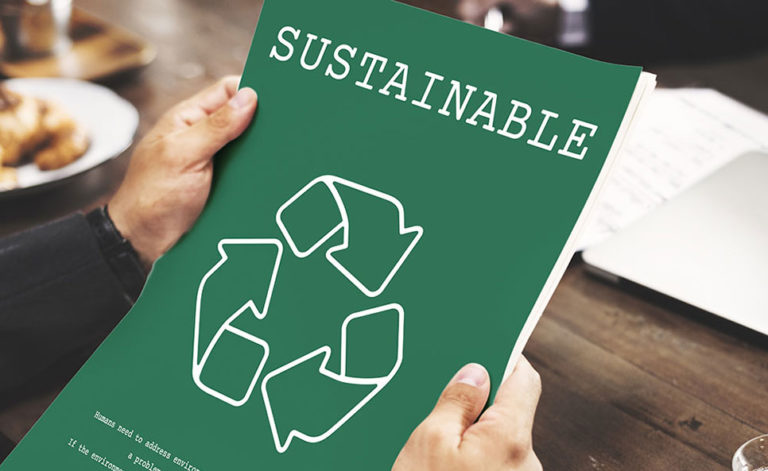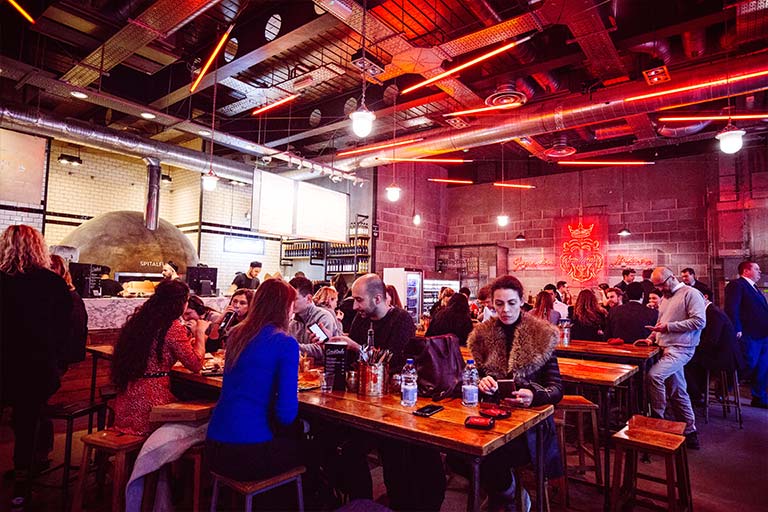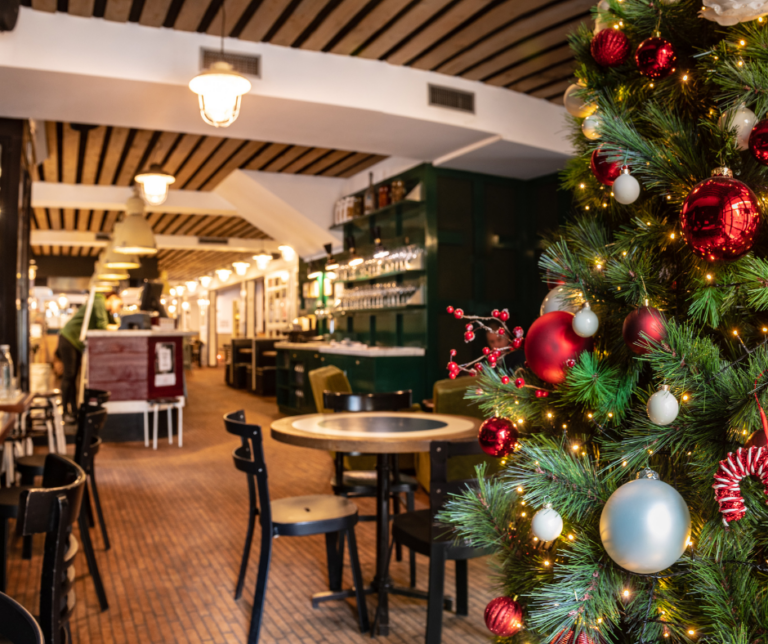What does restaurant sustainability actually mean?
Specifically for restaurants, it means a conscious effort to reduce your environmental impact by reducing food wastage, excess packaging, utility consumption and a commitment to shortening your supply chain, recycling and supporting sustainable food production.
In the UK alone, 1.1 million tonnes of food is wasted in the hospitality and food service sector each year, of which 75% is avoidable and could have been eaten. Food waste is an enormous contributor to carbon emissions (if it were a nation, it would be the third-largest carbon emitter after the US and China), but that’s not where the waste ends. 1.3 million tonnes of packaging and 0.66 million tonnes of other ‘non-food’ waste is thrown away by the UK industry every year.
Indeed, there are emissions at every stage of the supply chain and so by shortening this chain and sourcing from local suppliers, you are immediately reducing your carbon footprint.
Why should you commit to becoming more sustainable?
We are just coming through the tail end of a worldwide pandemic that has been catastrophic for the hospitality industry and so the growing importance of sustainability in 2019 was understandably side-tracked in favour of survival. But with the vaccine rollout and the recent milestone of indoor hospitality reopening on May 17th, the very real call for tackling climate change through sustainable practices will once again be firmly back on the agenda.
It’s important to your customers
The biggest demand for this comes from your customers and, in particular, the Gen Zers who, when recently polled by KAM Media, 48% said they would pick a brand to support based on their impact on the environment. A CGA/UK Hospitality survey found that over four in five respondents (83%) expect hospitality brands to take part in sustainable practices.
Interestingly, people’s social consciousness has only increased post-lockdown with 33% of consumers saying how sustainable a venue’s ingredients are has become more important to them vs. before lockdown.
Brand loyalty and customer growth
Sustainability is a big concern for customers and not something restaurants should just pay lip service to as another fad. Instead, it is actually an opportunity to differentiate your brand based on your sustainability practices. By aligning your restaurant values with your customers you will gain brand advocates who can help grow your customer base with social proof.
It’s important to your staff: employee engagement
There is far greater awareness of how we can do our bit to help combat climate change and for many, this extends to how they earn their money too. Demonstrating a strong social conscience can significantly boost staff morale, motivation and retention.
And let’s not forget that a big proportion of your customer-facing roles like FOH will be Gen Zers themselves. So indirectly you will attract and gain loyalty from your staff who will be proud to work for a company whose sustainability views align with their own. Given the pandemic has caused a real shortage in hospitality staff post-lockdown, being an ethical employer will only help when trying to attract and retain a high-quality workforce.
Improves your menu offering
Practising sustainability forces you to look more closely at your menu and often be more creative to ensure dishes are sourced from sustainable ingredients.
Raises your profile and brand equity
By communicating your sustainability mission on your menu, through your marketing and directly via your staff knowledge, you will not only be raising awareness of your sustainability credentials but also adding to the conversation around sustainability within the industry and the wider community. And on the back of this, by demonstrating a positive and inspiring example to others, you will only increase your long-term brand equity.
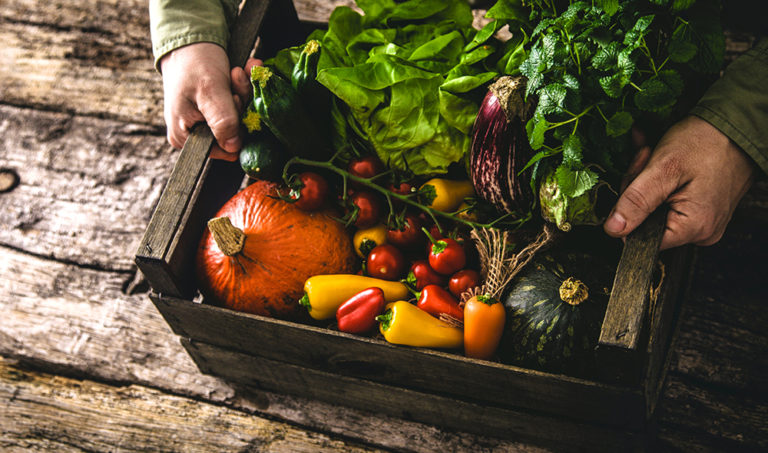
How can you be more sustainable?
Clearly, there are numerous business benefits to becoming more sustainable, so how do you go about it? Here are eight ways that you can start your sustainability journey:
1. Avoid food waste
No restaurant wants food waste – it costs money (£3.2 billion a year) and is pretty soul-destroying for chefs to throw away food so putting measures in place to reduce this is a no-brainer whether you are seeking to be sustainable or not.
WRAP has created a Guardians of Grub campaign to help restaurant workers take control of their food waste by providing tracking sheets and calculators to visibly see the amount of food being wasted. The mission is to “target, measure and act” to mitigate against this wastage and create lasting food wastage procedures. The Ship Inn, near Barrow in Furness signed up to the campaign and has managed to reduce their wastage by an incredible 72% chiefly by giving smaller portion sizes and reducing spoilage waste through better staff training and working practices.
Another idea used by the Spring restaurant in London is creating a ‘Scratch Menu’ which are dishes inspired by and compiled purely from ingredients that would otherwise have been wasted. It forces chefs to be creative and, for Spring, reduced their composting waste from 25% to 6%.
More recently high street brands including PizzaExpress, Wagamama, Frankie & Benny’s, Franco Manca, Chiquito, The Real Greek, Coppa Club, Tavolino and the D&D London group of restaurants have all pledged to do their bit to fight the War On Waste. They will all do more to promote take-home doggy bags to their customers, either by training staff or updating their menus.
2. Limit single-use plastics and non-recyclable packaging
Many large brands like McDonald’s have already changed their plastic straws to paper ones and in 2019 they made the paper ones fully recyclable. But it’s not just the visible single-use packaging like straws and disposable cups that restaurants should address.
A huge part of waste materials comes from the excessive packaging used in deliveries from suppliers, not to mention the miles of cling film used in the kitchen. Some restaurants have addressed this by requesting all suppliers deliver in reusable containers with zero packaging.
Large brands are leading the way like Greggs who have made several sustainability pledges, one of which is to use their sizable purchasing power responsibly to address excess packaging.
And if you can’t avoid using some packaging then sourcing the most sustainable option is the next best thing. For example, Just Eat has started working with packaging company Notpla to pack its sauces in biodegradable seaweed-based sachets rather than single-use plastics. More recently it developed a seaweed-lined takeaway box that is fully recyclable and can decompose within 4 weeks. Given that an estimated 500 million plastic takeaway boxes are used in the UK each year, this could be a gamechanger.
Smaller independents like West country coffeeshop chain, Boston Tea party have banned single–use cups altogether and people must bring their own cups. Although they took a hit initially on sales, long-term they gained respect from their customers and the title of “Britain’s Most Ethical Coffee Shop”.
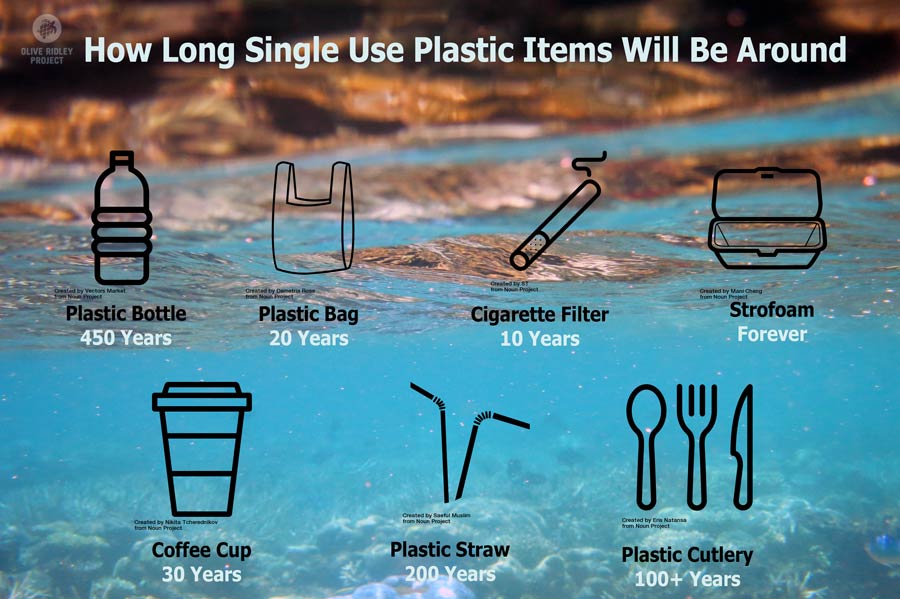
3. Adapt your menu
Use local/seasonal produce
This is one sure-fire way of lowering your carbon footprint by reducing the need for ingredients to be flown, shipped or driven long distances to reach you. Equally opting for sustainable ingredients like MSC (Marine Stewardship Council) accredited fish means you are not contributing to the problem with the dishes you are serving like Wahacca who is a carbon-neutral restaurant. They use FSC produce but when this becomes unaffordable (FSC tends to cost 8-12% more than non-FSC) they simply change the dish.
Another casual dining chain on track to becoming carbon neutral by the end of this year is Nandos and crucially they have achieved this not by offsetting their carbon footprint but by making changes to their operations that have directly reduced their carbon emission. Their goal is to be Net Zero by 2030. They are hitting these impressive targets by sourcing local ingredients for their 400-strong group and adding new plant-based options to their menu.
Less meat and dairy
By having fewer meat-based and more plant-based dishes on the menu can help your sustainability efforts massively. Why? Because of their huge reliance on environmental resources. A study by the University of Oxford found that meat and dairy provided just 18% of the world’s calories but accounted for 83% of the farmland and 60% of agriculture’s greenhouse gases.
It is fortunate then that the trend for veganism has continued its steady rise in popularity with 2021 its best year yet as more than 582,000 people from 219 countries signed up to the pledge.
4. Switch utilities to renewable energy providers
Spend on utilities represents a big chunk of your operating budget and so taking the time to switch to a green energy supplier and making your kitchen energy efficient can have a significant impact on your sustainability measures. Analysis by The Carbon Trust shows that 82% of your kitchen equipment’s life cycle cost is the energy used to operate it so switching to more energy-efficient appliances can equally save you money long-term.
Brewdog has recently achieved certified B Corp status and is the biggest beer business in the world to do so. Part of this commitment has been a £14m investment to install a bioplant at its headquarters which co-founder, James Watt explains “convert[s] our organic process waste to site generated biomethane (replacing all of our grid gas) and further reduce[s] our water usage by more than 40%.”
Costa Coffee is another hospitality heavyweight to show its green credentials by installing rapid EV chargers in 200 more of its drive-thru sites. The company has partnered with InstaVolt to install the chargers at new and existing stores, delivering charging speeds of up to 120kW on a pay-as-you-go basis. Costa Coffee UK & Ireland property director James Hamilton said: “We want to ensure we’re playing our part in enhancing our customers’ experience as they switch to more sustainable models of transport in that all-important step to tackle climate change.”
5. Use technology
Tackling issues like food waste is a big job particularly for multi-site operations and so many are turning to technology to help. Everything from kitchen management and stock control software can help plan accurate recipe construction, procure ingredients and record waste. More than a third (38%) of those operators surveyed by UK Hospitality’s Future Shock report who are tackling food waste say they are doing so with the help of smart procurement tools.
Smart tools such as Winnow bins can identify what is being discarded and its value based on AI technology and Mimica can predict precisely when ingredients will go off using a temperature-sensitive indicator cap or label.
Just by replacing your kitchen printers with KDS (Kitchen Display Screens), you can eliminate the need for paper and ink cartridges as orders go straight to the KDS for fulfilment.
6. Look beyond environmental sustainability to your ethical practices
Operating sustainably can go beyond reducing your environmental impact. Your ethical practices are being increasingly scrutinised by consumers who want to ensure they are giving their custom to brands that safeguard the welfare of their employees and operate ethically.
Consumers feel it is the responsibility of brands to “donate to social, ethical and green causes” according to a CGA BrandTrack survey. The vast majority (97%) of consumers think it is important that companies treat their workers fairly. Nearly as many (86%) think it is important that brands invest in their local communities, a figure that has risen two percentage points in a year.
The recent pandemic has only strengthened this belief and we have seen some hospitality brands going above and beyond to help others when they themselves have been struggling to survive. The Feed the NHS campaign raised over £1 million and helped brands donate 40,000 free meals a day to NHS workers.
Dishoom is another great example of a brand committed to helping others by donating a meal for every meal they serve. So far they have donated over 10 million meals to kids who would otherwise have gone hungry in India and the UK.
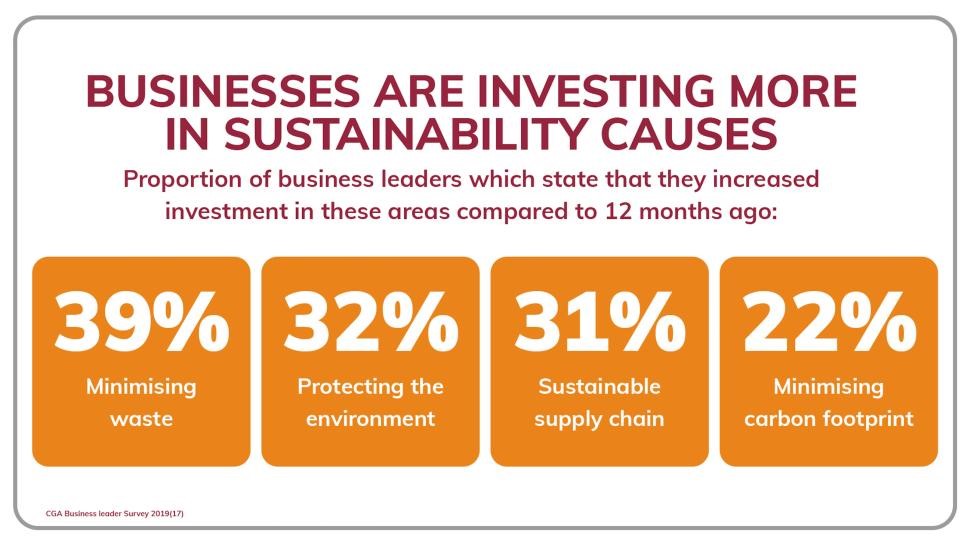
7. Empower your staff
Making pledges and committing budget to become more sustainable is almost fruitless unless you have the buy-in and 100% commitment from your staff. Often sustainability will involve changes in procedure and so this will require thorough staff training to help them adapt.
Appointing a sustainability champion within the business who really believes in the cause is one way you can harness the momentum for change and have that person or persons enthuse and educate your staff on the merits of sustainable practices.
Your staff are also the mouthpiece of your business and so educating them on all the various measures and commitments you have made as a business to becoming more sustainable will allow them to communicate this to your customers. We know customers want to support sustainable restaurants so ensure your staff can talk about the seasonality of your menu, the provenance of your ingredients and the ways you are trying to reduce your impact on the environment.
8. Don’t be overwhelmed, start small
Being sustainable is hard, costs money and takes a lot of work but ultimately it is what customers want. Try making small starts like printing your menus on recycled paper, displaying them on a board or digitally; swapping paper napkins for linen and ditching single-use plastic.
Equally, you need to manage the way you introduce your sustainability mission to your customers. While communicating your restaurant’s sustainability vision is important, your priority as a restaurateur should always be delivering an exceptional customer experience. Offer enough information through staff education, your website, or even your menu, so guests can ask for more details about sourcing and sustainability if they want them, but don’t shove the message down their throats.
Sustainability is no longer a buzzword. It should be part of every policy and every decision as a promise to our future generations. The pandemic may have upset the sustainability momentum that was building amongst hospitality (and in some ways, the demand for takeaway, while in lockdown, only increased our consumption of single-use packaging). But as hospitality reopens, this will be back on the agenda for customers who continue to view media around climate change and the importance of everyone playing their part, which includes where they choose to dine.
Brands that can prove their credentials on sustainability to consumers will have a competitive as well as ethical edge while those that don’t may become quickly overlooked. So if you haven’t already, now is the time to consider and address your sustainability commitments.
